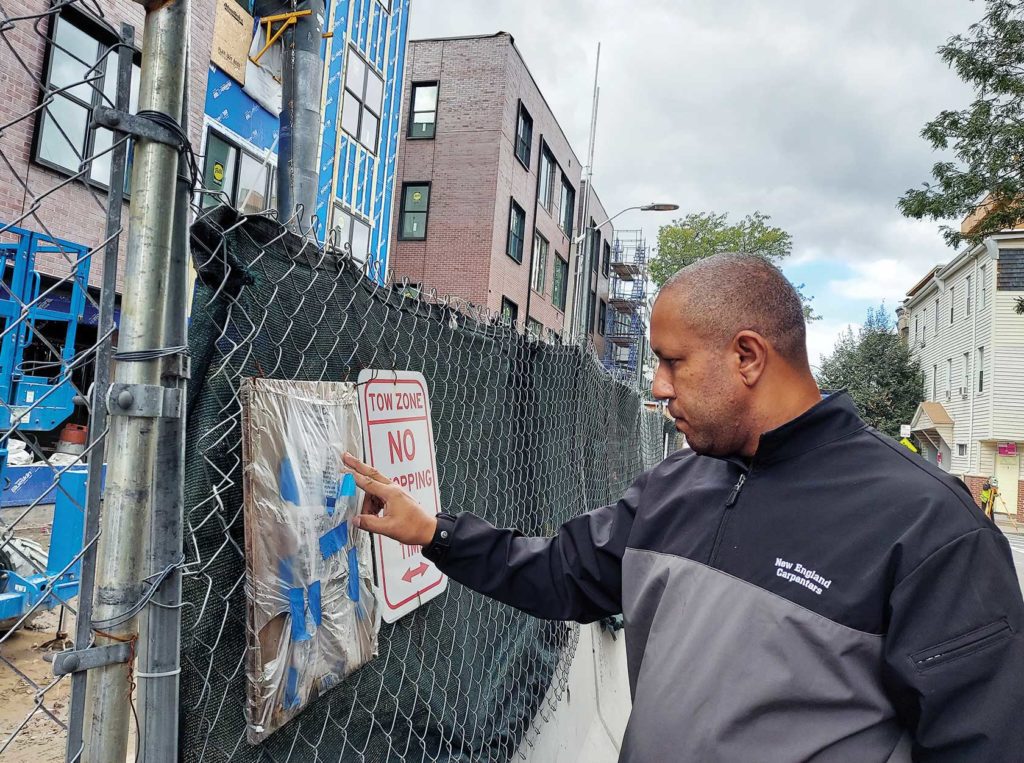Construction firms skirt law with cash payments
Many non-union workers denied benefits, protections

It’s not hard to find the construction workers who are paid under the table in East Boston.
“They’re on every construction site,” says Carpenters Union Local 723 organizer Carlos Desouza. “And on every single block there’s construction.”
On one block of Maverick Street that has a gut-rehab and two new condo buildings going up, Desouza sauntered up to a painter carrying an empty roller tray.
“Opa, primo,” he said by way of greeting, then inquired about work on the site. Are they hiring? Maybe. How are they getting paid? Cash and personal checks. Desouza knows what that means. No withholding. No Social Security payment. No workers’ compensation.
He’s not looking for work, but the question gives him an easy way to assess whether a contractor is paying workers off the books, a practice he estimates is happening in more than half the job sites in Boston.
While general contractors face a higher degree scrutiny and pay their workers salaries, benefits and health insurance, the subcontractors they hire for jobs such as plastering, framing, painting and drywall installation commonly cut costs by paying workers in cash or personal checks.
A study by the UMass Amherst Labor Center found that most workers in residential construction in Massachusetts are paid in cash.
“The majority of builders in residential construction have almost completely jettisoned regularized employees,” the center’s report reads. “The vast majority of these workers in non-union construction, under the current law in the commonwealth, should be classified as employees. The lack of regular employment in legitimate business creates the conditions for the hyper-exploitation of precarious and mostly undocumented workers.”
The report found widespread tax fraud and wage theft in the industry. Tax fraud in the construction industry across the U.S. is estimated to cost state and federal taxpayers $2.6 billion annually. As many as 1.2 million construction workers are paid off the books each year, while another 300,000 are misclassified as independent contractors.
For local construction workers, many of whom are immigrants, the construction jobs offer a leg up in the state’s economy. Workers Desouza speaks with regularly report wages of $20 to $25 an hour, well above the state minimum wage of $13.50 an hour. But Desouza says the lack of benefits or basic worker protections weighs on workers he’s reached out to.
“I’m working, but if I had benefits, it would be better,” said Joao, a carpenter who declined to give his last name for fear of reprisals from his employer. “When you get injured, they ask you to tell the hospital you were injured at home. You don’t get help with the bill. You don’t get paid for the time you’re out of work.”
Last year, when Joao suffered a puncture wound to his leg, his bill for an emergency room visit came to $495. Joao’s employer refused to cover the bill or the hours he missed. He was out of work on a Friday, but when the next week came around, the prospect of missed pay had him back at the job site, albeit with a limp.
“I was back at work on Tuesday,” he said. “I have to feed my family.”
Desouza and Local 723 Director of Organizing Noel Xavier say the lack of health care and benefits, unpaid overtime and wage theft are common among subcontractors, who bid low on contracts and cut costs on the backs of their workers.
“What we see from the back end is companies low-balling jobs,” Xavier said. “Their bid doesn’t take into account costs like payroll taxes, paid leave, things that legitimate companies have to pay.”
Joao, the carpenter working off the books, says he has applied for a union apprenticeship, under which he would earn $22 an hour plus a pension, sick leave, annual raises and other benefits.
“There’s no future where I’m working,” he said. “It’s just work, day by day.”
Xavier said the union is looking to City Hall for support. District 5 Councilor Ricardo Arroyo is drafting an ordinance that would make general contractors liable for labor violations committed by the subcontractors they hire.
“The ordinance would create a wage theft commission and protections for workers to ensure that violations by subcontractors are no longer given free rein,” Arroyo said. “It’s important that we make sure our workers are protected. We’ve seen multiple instances where workers are injured. We all pay a price for that, ultimately.”
The ordinance would also mandate that the city of Boston be barred from procuring construction services from contractors that have within the last five years been suspended by state, federal or local agencies, been in violation of workers’ compensation insurance or misclassified workers. Firms would be required to properly classify workers and comply with all state laws regarding payment of wages.
The ordinance would apply to projects funded by city tax breaks.
Back in East Boston, Desouza underscores the dangers workers face when they are employed by subcontractors who cut corners to cut costs.
On the fourth level of a new building, a worker stands on a ladder scaffold while applying foam insulation to the exterior. He wears no safety harness. While there’s a net that could theoretically catch a worker who falls, it’s not secured at the bottom, meaning a worker could easily slip through.
“I feel bad for him,” Desouza says, gesturing toward the worker. “He’s just trying to make a living.”







